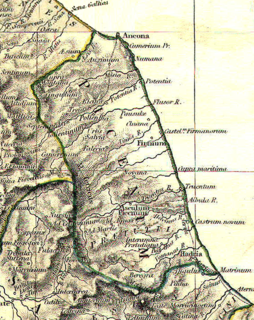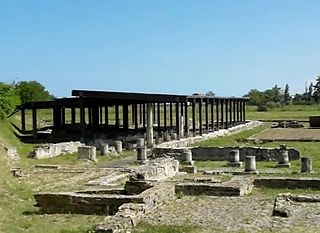 W
WPicenum was a region of ancient Italy. The name is an exonym assigned by the Romans, who conquered and incorporated it into the Roman Republic. Picenum was the Regio V in the augustan territorial organization of Roman Italy. Picenum was also the birthplace of such Roman notables as Pompey the Great and his father Pompeius Strabo. It was situated in what is now Marche and the northern part of Abruzzo. The Piceni or Picentes were the native population of Picenum, but they were not of uniform ethnicity. They maintained a religious centre in Cupra Marittima, in honor of the goddess Cupra.
 W
WAbruzzo is a region of Southern Italy with an area of 10,763 square km and a population of 1.3 million. It is divided into four provinces: L'Aquila, Teramo, Pescara, and Chieti. Its western border lies 80 km (50 mi) east of Rome. Abruzzo borders the region of Marche to the north, Lazio to the west and north-west, Molise to the south and the Adriatic Sea to the east. Geographically, Abruzzo is divided into a mountainous area in the west, which includes the Gran Sasso d'Italia, and a coastal area in the east with beaches on the Adriatic Sea.
 W
WThe Archaeological Park of Urbs Salvia is situated in the comune of Urbisaglia, in the Marches, Italy. It is the largest archaeological park in the region.
 W
WAtri is a comune in the Province of Teramo in the Abruzzo region of Italy. Atri is the setting of the poem The Bell of Atri by American writer Henry Wadsworth Longfellow. Its name is the origin of the name of the Emperor Hadrian.
 W
WFermo [ˈfermo] listen (help·info) is a town and comune of the Marche, Italy, in the Province of Fermo.
 W
WMarche is one of the twenty regions of Italy. In English, the region is referred to as The Marches. The name derives from the plural of the medieval word marca or march, originally referring to a borderland territory of the Holy Roman Empire, such as the March of Ancona and others pertaining to the ancient region.
 W
WPotentia was a Roman town along the central Adriatic Italian coast, near the modern town of Porto Recanati, in the province of Macerata. Its original position was just north of the main Roman bed of the River Potenza, which now flows more than 1 km (0.62 mi) to the north.
 W
WRicina or Helvia Recina was a Roman town located in the lower Potenza valley, the contemporary Italian region Marche.
 W
WSeptempeda was a Roman town in Picenum, now in the Italian region Marche. It became today's San Severino Marche after the fall of the Roman Empire.